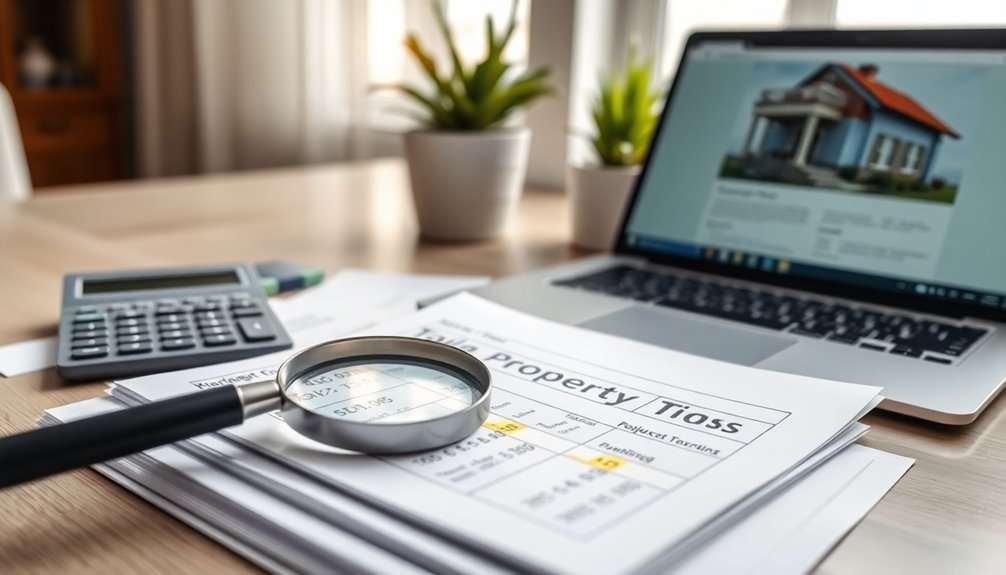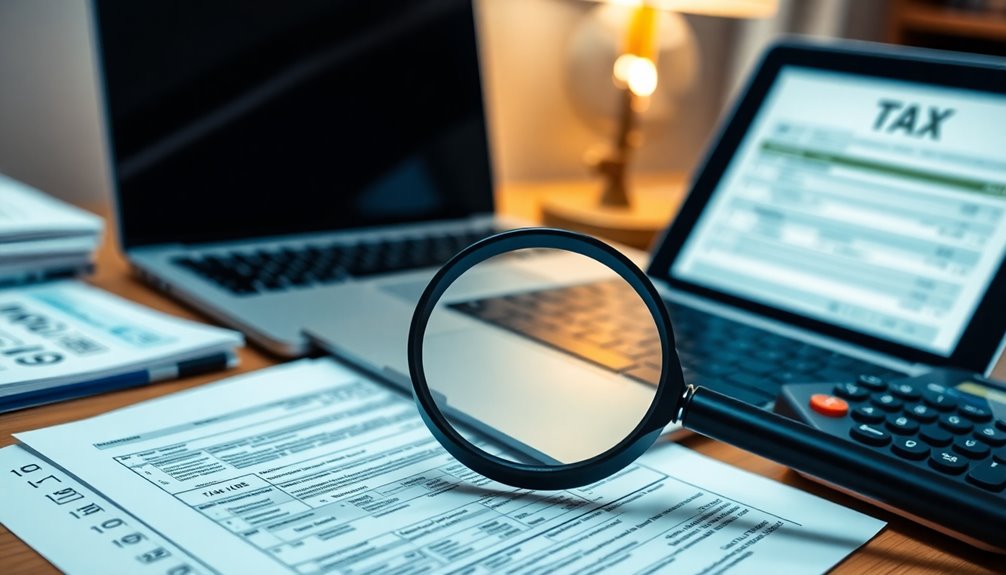To find out if taxes are owed on a property, start by checking its assessed value through the local assessor's office. You can then identify your local tax rates on government websites or by contacting your county tax office. Use these figures to calculate potential taxes due. Don't forget to review your tax bill for accuracy and to verify any exemptions that might apply. Payments are usually due on January 1, and late fees can accumulate quickly. For a clearer picture, local resources and professionals can offer valuable insights about your specific situation. You'll discover more helpful details soon.
Key Takeaways
- Check the local county or city tax office for outstanding property tax balances and payment history.
- Review the property tax bill for any unpaid amounts or special assessments listed.
- Utilize online property tax portals that provide information on tax delinquencies and current obligations.
- Contact local government officials to inquire about any liens or tax-related issues on the property.
- Verify if any exemptions or credits have been applied to the property's tax assessments.
Determine Property Value

When you want to find out if taxes are owed on a property, the first step is determining its value. You can use one of three main approaches: the market approach, cost approach, or income approach.
The market approach involves comparing your property to similar properties that've recently sold. You'll analyze sales prices carefully, considering size, quality, condition, location, and the time of sale to ensure a fair valuation.
The cost approach estimates how much it would cost to replace the structure, factoring in current labor and material prices. You'll subtract depreciation from this cost and then add the market value of the land. This method works well for unique or specialized properties.
Finally, the income approach focuses on the potential rental income a property could generate. Here, you need to consider operating expenses, maintenance costs, and expected returns on investment. This approach is mostly used for commercial properties.
Once you've assessed the value using these methods, the assessor will determine the market value, which is used to calculate the assessed value that influences your property taxes. Understanding how property taxes are calculated is crucial in determining if you owe taxes on the property.
Identify Local Tax Rates

After determining a property's value, the next step involves identifying the local tax rates that will affect your tax obligations. Start by checking your local government's website for property tax information. This is often the quickest way to access specific tax rates and details.
If you need more clarity, consider contacting your county or city tax office directly. They can provide precise information regarding your obligations.
You should also explore your state tax agency's web pages, as they often have comprehensive listings of local tax rates and regulations. Don't overlook local government publications or newsletters, which frequently include updates on tax rates and changes that could impact you.
As you gather this information, keep in mind that tax rates can vary significantly even within the same state. For instance, in New York, residential properties can face different assessment ratios and tax rates depending on the jurisdiction. Understanding these differences will help you gauge your potential tax responsibilities accurately. Many counties outside NYC report rates exceeding 2.50%, so be diligent in your research.
Finally, visiting the local tax assessor's office can provide you with detailed insights specific to your property type and location.
Calculate Potential Property Taxes

Calculating potential property taxes is crucial for understanding your financial obligations as a property owner. Start by determining the assessed value of the property. Multiply the market value by the assessment ratio, which varies by jurisdiction. For instance, if your property's market value is $100,000 and the assessment ratio is 35%, the assessed value would be $35,000.
Next, calculate the mill rate or tax rate, which combines local rates from the city, county, and school districts. One mill equals $1 for every $1,000 of assessed value. If the mill rate is 29 mills, that means you owe $29 for every $1,000 of assessed value.
Now, apply the tax rates to the assessed value. Multiply the assessed value by the mill rate to find the gross property taxes. For example, with an assessed value of $35,000 and a mill rate of 81.45 mills, your gross taxes would be $2,851.
Finally, account for any reductions or credits. Subtract applicable reductions like the Non-Business Credit from the gross taxes to find the net taxes due. This step can significantly lower your final tax amount, so be sure to check local policies. Understanding the total tax rate is essential since it can vary significantly across different jurisdictions.
Review and Verify Tax Bills

Once you've calculated potential property taxes, the next step is to review and verify your tax bills to ensure everything is accurate.
Start by checking the assessed value of your property; make sure it reflects current market conditions. Verify any exemptions applied, like STAR, Senior Citizens, or Veterans exemptions, to confirm they're correct. It's essential to ensure that the tax rate for each taxing jurisdiction is accurate as well. Remember that the statewide property tax rate in California is 1% of assessed value, which serves as a baseline for your calculations.
Look for any special assessments or additional charges included on the bill. Compare this year's assessment with previous years to identify any discrepancies.
To verify assessment details, obtain your property tax card from the local assessor's office. Review the lot size, room dimensions, and fixtures listed, noting any special features that could affect the assessment.
Be vigilant about checking for errors. Look out for mathematical mistakes or incorrect exemptions.
If you spot inconsistencies in the assessment roll or believe the assessment doesn't reflect your property's true market value, contact the local tax authority. You can appeal the assessment if necessary, gathering evidence and presenting your case to the Assessment Appeals Board.
Understand Payment Methods

When it comes to paying your property taxes, understanding the various payment methods available can make the process smoother and more efficient. You can pay online using eCheck or credit/debit cards. eChecks incur a $1 fee, while credit/debit card payments come with a convenience fee of $3 for balances under $100 or 3% for larger amounts. Just remember, online payments must be received by 11:59 PM on the due date.
If you prefer to pay by phone, you can use credit/debit cards or eChecks, with a $0.95 surcharge. In-person payments can be made at the Treasurer's Office or local banks, accepting cash, checks, and cards. Be aware that credit card payments can't be mailed.
For a more manageable option, consider setting up an impound account through your mortgage lender, which incorporates property taxes into your mortgage payments, or a bank savings account to save monthly. Services like EasySmartPay also allow monthly payments via ACH or credit card for a fee of 1.99%.
Each payment method may have unique fees and restrictions, so be sure to check your options carefully before deciding.
Check Due Dates

Understanding payment methods is just one part of managing your property taxes. You need to check due dates specific to your jurisdiction, as they can vary widely.
For instance, in Minnesota, the first half of manufactured home tax is due by August 31, while the second half is due by November 15. In other areas, secured property tax bills may have their first installment due on November 1 and the second on February 1. Keep in mind that municipal and county tax bills often have deadlines around May 31 or June 30. If you're in Florida, you might qualify for early payment discounts, such as 4% off if you pay in November. Additionally, note that the lien date for many states, such as Alaska and California, is set for January 1, which is crucial for determining tax obligations.
But be cautious—late payments can incur penalties, often around 10%, and additional costs can add up quickly.
Also, remember that if a due date falls on a weekend or holiday, your payment is due the next business day. Always check your local rules and notifications for any specific deadlines or procedures, so you can avoid penalties and stay on top of your property tax obligations.
Utilize Online Tax Calculators

Navigating the complexities of property taxes can be daunting, but utilizing online tax calculators simplifies the process. These tools allow you to estimate your property tax obligations quickly and accurately.
To get started, you'll need to input the property's taxable or market value, specify its location, and select the relevant school district or local jurisdiction if applicable. Additionally, you may want to consider the data sourced from the Minnesota Department of Revenue to better understand the tax landscape.
Next, use current millage rates for your calculations. Remember to convert mill rates to decimal form and apply any taxable ratios as required by state law. You can easily calculate both annual and monthly tax estimates, factoring in any additional levies or exemptions.
You can find online calculators on local government websites, like Canton Township, MI, or through organizations such as the League of Minnesota Cities. Real estate websites like Zillow also offer useful tools.
As you interpret your results, keep in mind that estimates may differ from actual taxes due to changing property values and rates. If you want more precise information, consider reaching out to your local assessing department.
Explore Local Resources

After estimating your property tax obligations using online calculators, the next step is to explore local resources that can provide more detailed information.
Start by contacting local county officials. The County Director of Equalization can answer questions about your property's assessed value and provide a copy of the assessment notice. If you have inquiries regarding your tax bill, reach out to the County Treasurer. They can help clarify any confusion and provide copies of tax bills.
Don't forget to review local government websites. Check for tax-delinquent property listings and utilize resources like the South Dakota Property Tax Portal. These sites often offer tools that break down tax levies and provide historical data on assessed values. Additionally, be sure to research local regulations related to property taxes, as they can vary significantly from one municipality to another.
Visiting local Assessment and Taxation Departments is another smart move. These departments handle property tax bills and can assist you with exemptions for seniors, veterans, or disabilities.
You can also conduct title searches to uncover any liens on the property and inspect it for visible issues. Evaluating neighboring property values can help you understand the market better, guiding you in determining if taxes are owed on your property.
Consult Tax Professionals

Consulting tax professionals can be a game changer when it comes to understanding your property tax situation. They bring expertise that can help you navigate complex tax laws and ensure you're making informed decisions.
Start by reaching out to your local assessor's office to review the tentative assessment roll; they can provide current property values and answer any questions about discrepancies.
For more intricate cases, especially if your property generates substantial income or is valued at millions, consider hiring a Certified Tax Coach or a CPA. These professionals can prepare tax appeals, audit income statements, and certify documents like Form TC-309 in NYC. They can also assist you with the appeal process since many property owners are unaware of the possibility of appealing assessments.
They'll help you understand valuation methods, such as fair market value or income capitalization, which can strengthen your case for a lower assessment.
Additionally, tax professionals will guide you in completing necessary forms for appeals. In NYC, forms like TC-101 and TC-201 are essential, and they'll ensure you meet deadlines to file corrections.
Frequently Asked Questions
How Can I Find the History of Property Tax Payments?
To find the history of property tax payments, start by visiting your local tax assessor's website.
Use the Property Tax Lookup tool to enter your property address or tax account number.
You can also check your statements or receipts for payment history.
If you need further information, don't hesitate to contact your local tax office directly.
They can provide you with detailed records and answer any specific questions you might have.
What Happens if Property Taxes Are Not Paid on Time?
If you don't pay your property taxes on time, you'll face penalties and fees that can quickly add up.
Depending on where you live, you might incur a monthly interest charge or a flat penalty.
Eventually, a tax lien could be placed on your property, leading to potential legal actions, like wage garnishment or even foreclosure.
If unpaid for too long, your property could be sold to recover those taxes.
Are There Exemptions for Seniors or Disabled Individuals?
Yes, there are exemptions for seniors and disabled individuals.
If you're 65 or older or disabled, you may qualify for tax reductions based on your income and property value.
You'll need to provide proof of age or disability when applying.
Check with your local assessor's office for specific eligibility criteria, application processes, and deadlines.
These exemptions can significantly lower your property tax liability, offering financial relief you might need.
How Do I Contest an Inaccurate Property Tax Assessment?
To contest an inaccurate property tax assessment, start by gathering evidence.
Check if your property's assessed value aligns with similar homes in your area. If you find discrepancies, consider getting a professional appraisal.
Next, file your appeal within the deadline, using the method that suits you best—online, in person, or by mail.
Be prepared to pay your taxes while waiting for the appeal outcome, and explore your options for hearings or arbitration.
Can Property Taxes Be Included in a Mortgage Refinance?
Yes, property taxes can be included in a mortgage refinance through an escrow account.
This means your lender collects the taxes as part of your monthly payment and pays them on your behalf when they're due. However, you're still responsible for ensuring they're paid.
Depending on your lender and loan type, there may be different requirements for how property taxes are handled, so it's important to clarify these details during the refinancing process.
Conclusion
In conclusion, finding out if taxes are owed on a property doesn't have to be overwhelming. By determining the property value, identifying local tax rates, and reviewing tax bills, you can get a clear picture. Don't forget to check due dates and explore online resources to simplify the process. If you're ever in doubt, consulting a tax professional can provide peace of mind. Stay informed, and you'll manage your property taxes like a pro!









